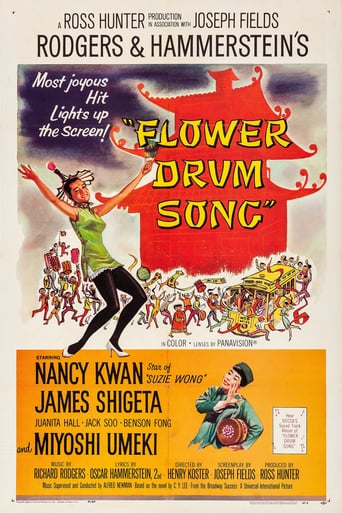


Flower Drum Song
A young woman arrives in San Francisco's Chinatown from Hong Kong with the intention of marrying a rakish nightclub owner, unaware he is involved with one of his singers.
-
- Cast:
- Nancy Kwan , James Shigeta , Benson Fong , Jack Soo , Juanita Hall , Reiko Sato , Patrick Adiarte


Similar titles

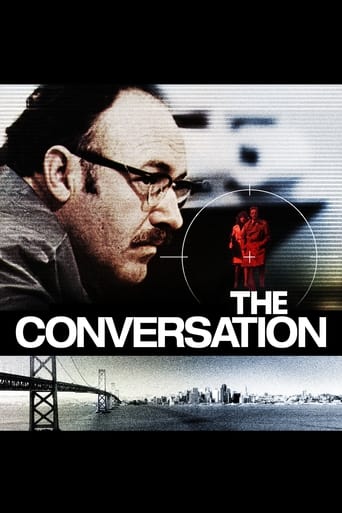
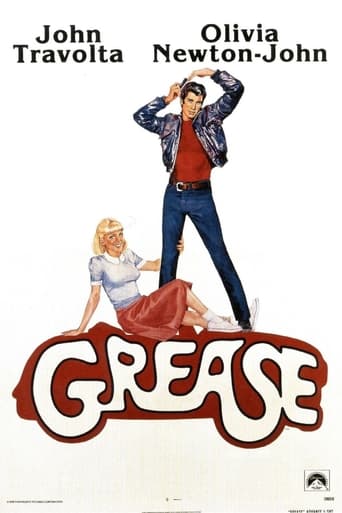


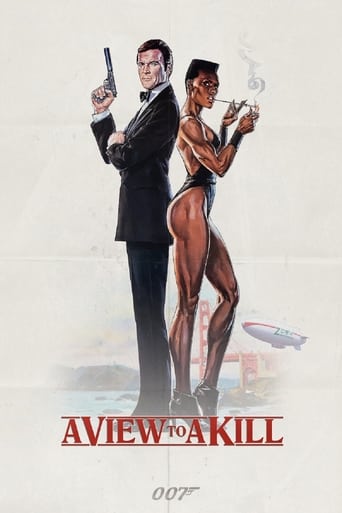
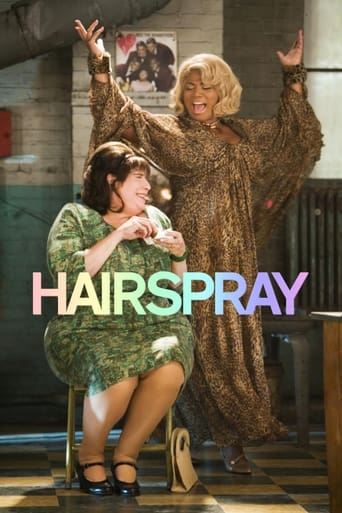
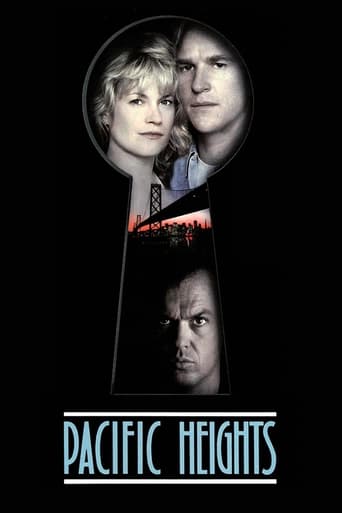
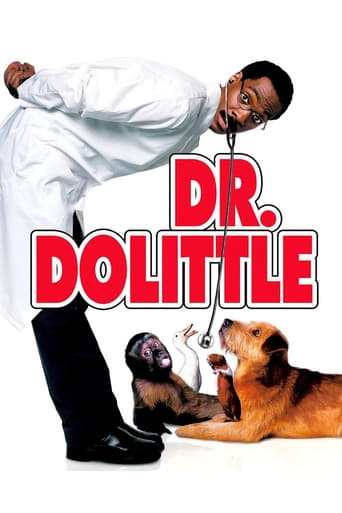
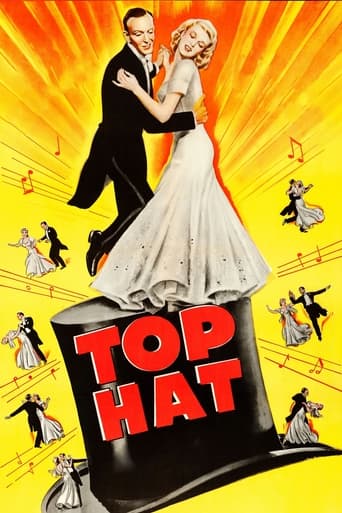
Reviews
Too much of everything
So much average
Excellent but underrated film
Best movie ever!
Some Rodgers and Hammerstein movies hold up very well today, like "The King and I," some don't, like "South Pacific." This one belongs in the first category. It is beautifully photographed, has an intriguing story, great acting and very good songs and dances.I am not sure that people under 40 can appreciate how unique this movie was. Since the 1970's, everybody has seen Kung Fu and Art movies with all Asian casts. However, in 1961, this film was really the first to show Asia-Americans as real human beings with jobs, families, desires and worries. While there is a touch of a patronizing undertone, the film is generally anti-racist. The audience really care about and relate to the characters.The scene of Nancy Kwan singing to herself in three mirrors wearing a towel is still shocking. It is wrong on so many levels. It is demeaning to both women and Asian-Americans. She is turning herself into an exotic sex toy for men. Yet the scene is equally empowering to women and Asian-Americans. She is embracing her body and her right to be modern and reject stereotypical customs.The film really is Chop Suey, an American invented dish made up of lots of different foods prepared by Chinese chefs. By the end, what is Chinese and what is American is difficult to tell and that's the brilliance of this dish.
I don't think this movie was really up to par with other R&H movies. The songs were just O.K. and to be honest Mei Li was one of the worst characters in the whole movie for me. Mei Li had no personality whatsoever. Throughout the whole movie, she was just a Mary Jane- hardly the right personality for a main character! As for Linda, she has no dreams or goals besides being a fifties housewife. But, now that we think about it, isn't that what Mei was going to do to? Oh, yeah. So Mei Li is like Linda, except with less personality. The one possible character who had hope in becoming three-dimensional with real thoughts and feelings was the supporting character who didn't get a happy ending, Helen Chao. In the book version she commits suicide, in the movie version she just disappears! She selflessly took the heartbroken Ta to her house to have a place to sleep, and then he leaves her, without even trying the breakfast she made for him. Mei comes later and jumps to conclusions and by then we all know how the movie ends. And that's it. Helen, a poor seamstress, the childhood friend of Ta, arguably the most self-sacrificing character in the movie, just disappears from the story line. Okay, so was it really that necessary to make Helen in love with Ta, too? I didn't read the book, but I hope it was for more than an excuse for a musical number. So in the end, everyone (meaning Sammy and Linda and Ta and Mei) is happy and married, while poor Helen rots away in heart ache and nothingness. Her character had so much potential. She knew Ta for so long and she obviously cared for him before Mei or Linda came along- Linda wanting Ta to make Sammy propose and Mei because she needed a wealthy husband. Now, tell me, who cared the most for Ta, considering all their initial motives? Oh, that's right- Helen. Except, thanks to R&H, she's gone. If given the option, I wouldn't watch this movie again.
The authenticity of "Flower Drum Song" stems, I assert, from C.Y. Lee's clever blending of Eastern and 1960s San Francisco U.S. cultural elements. In the attempt to transfer the ethereal charm of Rodgers' and Hammerstein's' musical play made from the Lee's book to the screen, the difficult obviously lay in not losing the intimacy, the almost magical details, the subtlety and humor of the musical; but at the same time it was necessary for the filmmakers, Director Henry Koster and screenwriter Joseph Fields, to "open out" what on stage had been suggested. Fields and Ross Hunter produced; and Edward Muhl of Universal made a largely successful attempt here to create an MGM style musical at his smaller studio. So many moments, numbers, physical gestures, actions, dialogs and dance numbers work very well in the film that it is hard to quarrel with the adapters' approach; the occasional sluggishness in the film, which is undoubtedly present, I suggest is due to the very real nature of what people and doing in their relationships; realism takes longer, but ultimately here, as usual, it produces a very memorable set of characters and a beautiful experience. The cast is headed by talented Jack Soo, portraying what someone has called a "Nathan Detroit" like figure; his brilliant characterization is matched by James Shigeta's as a nice but callow young student 'prince' of San Francisco's Chinatown and Miyoshi Umecki's as elfin Mei Li, the brave 'picture bride" who sneaks into the country with her father, Kam Tong, in order not to have to wait five more years to be allowed in on a quota so she can get married. Nancy Kwan as the girl whom Soo loves and who pursues Shigeta is brassy, dynamic but not quite right in her pivotal role. Others in the very well-trained cast of underemployed Oriental professionals include powerful Benson Fong, playing above his age as Shigeta's very Chinese father, charming Juanita Hall as his wisecracking sister-in-law, dancer Reiko Sato as the tragic Helen, lithe dancer Patrick Adiarte as Fong's Americanized number two son, plus Victor Sen- Yung, Madame Soo Yong, James Hong and many others. The film is also notable for Irene Sharaff's costumes, bright cinematography by Russell Mettey, inspired art direction by Alexander Golitzen and Joseph C. Wright plus unusually elaborate and difficult set decorations by Howard Bristol. Dong Kingman provided the atmospheric paintings used in the credits, and Hermes Pan was responsible for the choreographing of a series of small, medium and large-scale dance numbers including the unforgettable "Love Look Away" dream ballet, which comes after a wonderful rendition of this lovely song by Marilyn Horne. This is a woman's musical, with its emphasis on relationships, monitorings of behaviors, and the many females in the cast who are presented more powerfully than are the males. But it is surprisingly even in its pacing, and only diffuses its power a little to accommodate the many characters within its cast plus a Chinatown parade, a graduation party, a large wedding and several numbers at the Celestial Gardens Nightclub. Memorable songs include, "Sunday,", "Don't Marry Me", "Chop Suey", "The Other Generation", "A Hundred Million Miracles" , "You Are Beautiful, ""Fan Tan Fanny", I Enjoy Being a Girl", "Hliding Through My Memory" and "I Am Going to Like It Here". This I assert is an affecting and unhurried film, but one whose intimate moments work brilliantly, and whose more opulent numbers only slow the pace a little here and there.
Popular consensus holds that "Flower Drum Song" is a weak link in the Rodgers and Hammerstein canon, and that's mostly true. It doesn't have as important a story to tell, and since it's not a period piece it's the most badly dated. And certainly, in cinematic terms alone, the film version is one of the worst of the stage-to-screen R&H adaptations.But all of that aside, there's something about this film that utterly charms me. A great deal of that charm resides in Nancy Kwan, who looks sexy and gorgeous in this and played a large role in many an adolescent fantasy as a result of her appearance in this film. But beyond her, there's much to like about the movie. It tells a sweet, simple story that may not be profound, but is certainly harmless enough. The score, while not R&H's best, is still full of enjoyable and hummable tunes. And there are a couple of truly memorable production numbers, like the "Sunday" sequence, or the lengthy and trippy ballet in the middle of the film, that stops the show even if it feels somewhat out of place.All in all, you could do much worse.Grade: B
